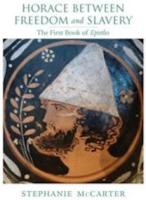
University of Wisconsin Press (2015) h/b 359pp £59.95 (ISBN 9780299305703)
Great literature is usually multi-layered and benefits from insightful commentary to unpick its meanings, and that is exactly what we get in this delightful book. It is central to M.’s thesis that Epistles I is much more than a bundle of letters and was intended by its author to be published as a single work, a libellum (we would now call it a ‘novella’: think Jane Austen’s Lady Susan). In the work as a whole, Horace explores ‘freedom’ (libertas): absolute freedom is attractive but leads to isolation, and if one wants the benefits of social contact, as Horace does, one must accept obligations. The key is moderation. True virtue (vera virtus) is a mean between the two extremes of absolute freedom and slavishness, and the way to achieve it is adaptability, a willingness to adjust one’s behaviour according to the situation one finds oneself in. Epistles I presents the character Horace, starting with an uncompromising view of ‘freedom’ (and being quite rude to Maecenas) in the first poem, and gradually moving to the more nuanced view of ‘freedom’ characterised by moderation and adaptability. In the course of advising his friends, he reveals himself as being subject to the same temptations and gradually overcoming them.
The freedom-slavery tension is treated in four main contexts, and the poems shift backwards and forwards between them: philosophy, town-versus-country, friendship and poetry. In successive chapters M. takes her scalpel and dissects those poems which deal with these themes, as Horace now deals out advice to his addressees, now struggles to apply the same lessons to himself. In the background, seldom openly stated but always subtly apparent, is the new social situation developing as Rome slides into the Augustan age. Horace, a freedman’s son, reacts against the idea of servitude, whether to a person, a philosophy or even a poetic style; yet to achieve the success which he desires, he must engage with these and accept some obligations. He will use philosophical ideas, modelling himself on the eclectic Cypriot philosopher Aristippus, without allowing himself to be ‘used’ by any (e.g. Stoic or Epicurean) dogma. In his friendships and other social interactions, he will accept obligations but expect some reciprocity; and that applies also to the relationship between a client and a powerful patron, something fraught with special difficulties, yet essential for a man like Horace if he is to achieve a social position: in the longest poem, I.18, Horace instructs his young friend Lollius how to deal with such a patron while keeping his self-respect, and we can see his own problems with Maecenas in the background.
M. shows clearly how Epistles I builds on ideas already adumbrated in Horace’s earlier poetry, especially the Satires, as well as in other authors (Cicero, Livy, Plato). Frequently she picks up key words which Horace uses, and links them to those other sources. All the points made are liberally illustrated by quotations, and one of the pleasures of the book is that these texts are always given in full Latin or Greek, followed by translation. From this, as a bonus, we can see what a superb poet Horace is, because, as with all the great ones, the original (once grasped) is always sharper, clearer and more compelling than the English. There are extensive notes, bibliography and index.
Sometimes the book seems a little repetitive and one feels that M. might have made her point more briskly, but that is a very minor caveat. There are also, yet again, some proofreading errors (what is it about academic publishers these days?). All that said, this book would be a very valuable companion for anyone reading or studying the Epistles. Not least, it increases one’s admiration for Horace, his talent and sophistication. Definitely a Best Buy.
Colin McDonald
